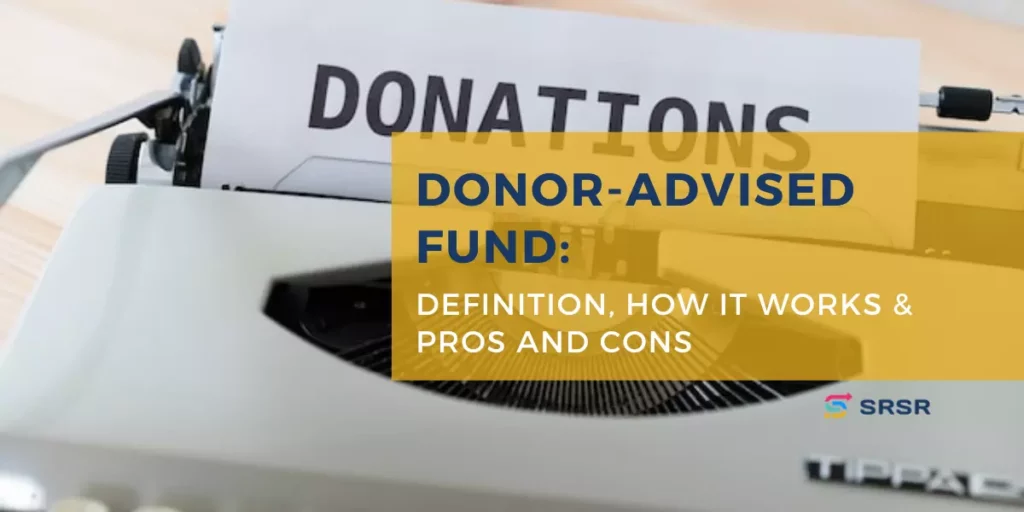As an entrepreneur, a successful business may bring about more money than you know what to do with. Some donate to the charity of their choice as a way to use their funds intelligently. Many entrepreneurs choose a donor-advised fund to make their charitable contributions, philanthropy’s fastest-growing donation option. In this article, we’ll look at the definition of a DAF, the pros and cons of this investment strategy, how it works, and more.

Defining a donor-advised fund
A donor-advised fund is a form of charitable investment. Its purpose is to support charities and charitable organizations you want to assist. A DAF makes it much easier to utilize your funds for charity. It’s a private fund, typically put together by a third party, to keep track of charitable donations for a family, individual, or organization.
Donating funds, assets, and securities to a donor-advised public charity often means businesses receive an immediate tax write-off, allowing you, as the entrepreneur, to make tax-free investments while giving to your favorite charity.
How does a DAF work?
Typically, a DAF is a registered and qualified organization. They receive funding with various assets, from value-appreciated securities to cash. These values go into an account under the donor’s name, held by the sponsor, and given to the chosen charity at the end of a specific period.
Once funds are donated, you may make a current tax reduction based on the donation. This deduction may occur even if the funds aren’t out of the holding period.
This unique system offers an incentive for successful entrepreneurs to donate to charities, even if their money stays stagnant for a period. Many professionals pay more than they usually would to a DAF for the tax credit. A donor-advised fund simplifies the process.
There are three steps in the simplified version of the DAF process.
Donors contribute
First, donors contribute to a donor-advised fund. This asset is irrevocable, so the donor cannot access the money once given to the fund. Once this donation is in the system, the donor may take control of a tax reduction. The donor typically establishes an account and determines what they can give. The giving might include stocks, non-publicly traded assets, or cash.
Assets rise
Once in the DAF, the donations may be invested for practical business purposes. Investment growth that occurs is tax-free for the donor and will provide benefits for any entrepreneur.
Growth of this money can benefit your business or provide an open door to donate to other charitable organizations. There are multiple investment opportunities for smart financial moves to ensure the money grows as much as possible.
Charities do well
The end of this process is that charities do well. Once the donor has invested in a DAF, they can recommend grants from the assets in the DAF to assist other qualifying organizations.
If an organization qualifies, you can support it from the DAF. Anything from a homeless shelter to a church will receive your funds if they meet the requirements. The charity in charge of your DAF will ensure the funds move to qualified charities and the assets go to work for charitable efforts.
Benefits of a donor-advised fund
Before investing in a donor-advised fund, it’s a good idea to check out the benefits with the decision to move your money to a charitable spot.
Contribute a high range of assets with ease
One benefit of a donor-advised fund is the wide range of assets you may contribute to the charity of your choice. Cash is one option, but there are additional choices for excellent charitable contributions.
A few accepted versions include the following:
- Publicly traded securities
- Bitcoin and cryptocurrencies
- Some complex assets
- Cash equivalents
- Hedge fund interests and private equity
Each is a valid form of a donation to a DAF, though not every sponsor will accept forms other than the traditional cash, check, or wired transfer.
With your account, it’s simple to transform various funds from one location to another. Sometimes, all it takes is a simple click of a button, and assets go into the donor-advised fund.
Use tax-free growth by investing your donation
Tax-free growth is an asset few entrepreneurs have access to on their journey. By using a DAF to donate to your favorite charities, you have the opportunity to dive into tax-free growth. You have the chance to recommend a practical growth strategy for your account.
With the right growth strategy, there is a chance you could bring in more money to donate to additional charities. There are even options in certain organizations to nominate your financial advisor to monitor and control the investment inside the fund. They will help ensure growth.
Provide support for legacy planning
Donations to a DAF may also benefit planning for your future. You may make a bequest in your will or ensure the sponsor inherits your retirement plan or another fund. Leave them instructions to ensure your money goes to multiple charities if something happens unexpectedly in your life.
Several sponsoring organizations permit moving funds to your favorite charities or heirs after passing. Each is different, but one thing is secure — DAFs allow you control over your money as an entrepreneur after you pass. You can rest assured, knowing your money goes to charities and people you care about around the world.
Simplified recordkeeping and organization
It’s tricky to keep track of all the charities your business donates to once you have enough funds. The choice to invest in a DAF simplifies everything. Rather than taking note of your donations, all you need to do is hold onto the donor-advised fund receipt.
Most sponsors offer websites where you make an account to donate or recommend your funds. A simple login is enough to show you where your money moves.
Drawbacks of a donor-advised fund
It’s also vital to think about the drawbacks before investing in a donor-advised fund to consider all sides of this form of charitable donation.
Sometimes no final say in the receiving charity
Although most sponsors promise the donors they will retain control over the finances, it doesn’t always end up that way. Ultimately, the money is under the control of the sponsor, and they may not always have good intentions.
Some sponsors donate money to other charities, while others have even put funds to use as a sponsor for a golf tournament. It’s critical to be aware of who you are interacting with when opening up a DAF. Your money may not go where you thought it would as a charitable donation.
Required fee and a minimum donation
Many donor-advised funds have required fees and minimum donation amounts. Donors who want to offer less than the minimum will not open up a DAF and help the charity of their choice through this method.
Funds have reportedly profited from the fees they charge donors to donate. There also tend to be many hidden fees, potentially benefiting wealthy clients, as opposed to the charities the money should go toward from the donor’s finances.
Irrevocable money
The funds are irrevocable once donated, like any other donation involving a tax benefit. Once the money goes into the DAF and you possess a tax cut, there is no way to get your funds back.
Irrevocable donations are critical to ponder because if you donate other assets, you may lose a vital part of your forward momentum as an entrepreneur. Think about your funds before putting them in a donor-advised fund.
Assets may sit in funds for extensive periods
Although you ideally have a say over what happens to your money in a DAF, that’s not always the case. Sometimes, funds will sit in a DAF for a long time before being dispersed to the charity. This sitting time may be quick, or it could stretch on decades before ending.
The donor will receive the tax credit, even if their donation is not dispersed to the charity of their choice right away. However, they might not get the satisfaction of seeing the funds go to the charity.
Considerations before opening a DAF

Take a look at several items before opening a DAF as an entrepreneur. These will help you make the best steps for your charitable donations, opening up doors in the future rather than closing them off.
Consider the minimum contribution and size of the grant
Over the years, DAFs have become more and more popular. This rise in DAFs means a significant drop in grant minimum and contributions. It’s easier than ever for those who aren’t rolling in wealth to establish a DAF for charitable donations.
Consider what varying DAFs require from donors to function in their grants. Some allow donors to open a DAF for no money, while others might request over $10,000. You should also check out the minimum grant contribution size, especially if you plan to push forward small recommendations at a time. Some are as small as $25, while others stretch to over $250.
Think about fees
Ponder fees that are required to put your assets in a DAF. Typically, there are two fees. One comes from the investments in the DAF, while the other goes toward the general administration cost of this fund.
Some DAFs charge minimal fees, while others will ask for a significant sum if your donation is above a specific amount. It’s also vital to note that recommending grants will incur fewer fees than the initial donation process. Consider fees before opening a DAF to avoid being caught by surprise.
Ponder available assets allowed for donation
If you want to stay on the safe side, go with cash, check, or wired transfer to open a DAF. Those who want to use their assets as a form of donation should turn to larger DAFs that feel safe enough to allow that type of transaction.
There are several assets available to donate:
- Some complex assets
- Some restricted stock
- Life insurance policies
- Hedge fund interest and private equity
- Mutual fund shares
- Long-term appreciated securities
Some DAFs may take all these, while others may request only one or two.
If you have a specific holding you want to donate to your DAF, check out your options. Not every organization permits these unique offerings.
Ask about the level of donor service
Consider the level of service you will receive from the sponsor as a donor. The higher you move in the ranks, the more likely they can assist you with your business assets. Is there a website you can use? An app? What does the employee response time look like if there is a hotline or physical building location?
Ensure you research various DAFs ahead of time to ensure they are a quality match. Not every fund will have the features or assistance necessary to help you feel comfortable with your charitable donation.
Check out investment options
Finally, look at the potential investment opportunities offered by a sponsor before opening a DAF. You should be able to request how your money works in the system.
There are typically a few popular investment strategies:
- Income
- Growth and Income
- Index-tracking investment pools
You should have a say in what happens to your funds once invested.
Investment pools cover a multitude of strategies to benefit your future. You can invest in these domestically or internationally with the right sponsor. Another item to consider is whether or not you can designate a financial advisor for more control over your donor-advised fund.
Sponsoring charity types for DAFs
There are three main sponsoring charity types for DAFs. Each offers something different to the individual offering money or assets to open a fund.
1. Public foundations
Most public foundations focus on one issue or a specific region. They operate nationally and internationally, offering points of expertise to donors to help them land something that means a lot to them. You may donate to build homes for the homeless or establish a charitable mission within a hospital hundreds of miles away.
2. Community foundations
Community foundations are one of the most common forms of sponsorship for donor-advised funds. They are leaders in this form of donation, paving the way for others to follow. The community option works well for donors who want to give locally and are looking for an alternative to the traditional checkbook giving options.
3. National donor-advised fund organizations
Finally, consider national donor-advised fund organizations. There are less than 100 right now, each with different offerings, such as the Fidelity Giving Account. They are national and primarily operate online.
Requirements for grant recipient eligibility
A charity must possess a 501(c)(3) designation to receive a grant from a donor-advised fund. They also need to be classified as a public charity by the IRS, opening up to receive funds in grant form.
Grants can be recommended to charities in the environment, food, education, religion sectors, and more. As long as they meet the above two requirements, they are permitted to receive a grant from a DAF.
You may not recommend a grant to political figures, parties, candidates, personal benefits, or private nonoperating foundations. These do not qualify for grant assistance from a donor-advised fund.
DAF impacts on charitable giving

Not only is a DAF a simple way for donors to offer money to charities of their choosing, but donor-advised funds have also led to a significant uptick in donations over the years. The incentive to gain a tax credit is enough for many businesses to donate more than they typically would in a year.
Some donors donate, then wait to move forward with their future investments. Others immediately recommend grants to get their money out to others. DAF has had an overall beneficial impact on charitable giving from every kind of entrepreneur on the market.
How does DAF compare to other charitable giving options?
A DAF is a solid giving option, more available than ever to entrepreneurs and business owners of varying income levels. It saves you the stress of keeping track of your donations and offers the chance to invest money tax-free.
DAFs offer beneficial tax advantages. They also allow you more control over your investment, which is ideal for those who like to see their assets from beginning to end. It’s a simpler and more comforting way to make charitable donations.
Donor-Advised Funds — a tax-advantageous way to help charities you care about
Deciding to assist charities you love through a donor-advised fund is a choice that will benefit your future investments and allow charities of your choice to thrive through guaranteed monitoring by the sponsoring charity. Although there is some controversy about the holding period of the money, a DAF is an excellent choice for entrepreneurs desiring to put growing money toward charitable donations for a tax exemption. If you’ve decided a donor-advised fund is ideal, look at Project Newport’s post on the definition of legacy and charitable giving.

